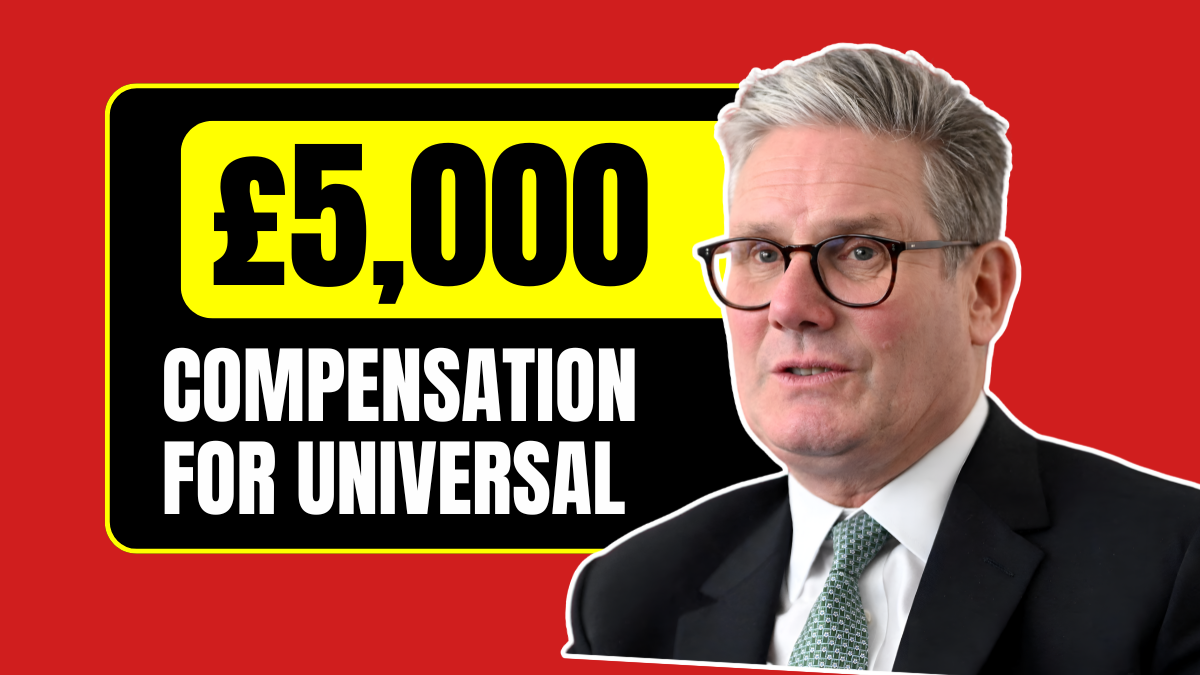Thousands of people across the UK who moved from old-style benefits to Universal Credit (UC) could soon receive compensation of up to £5,000 from the Department for Work and Pensions (DWP). If you were receiving extra disability payments before switching to UC and saw that support disappear, this news could apply to you.
The DWP has finally confirmed that it is launching a large-scale compensation plan to make up for financial losses many people faced during the transition to Universal Credit—especially those who had been receiving the Severe Disability Premium (SDP) or the Enhanced Disability Premium (EDP).
Let’s walk through everything you need to know about this payment, who qualifies, how much money is involved, and what you should do next.
What’s This Compensation About?
When Universal Credit was introduced, it was meant to simplify the benefits system by combining several older (or “legacy”) benefits into a single monthly payment. But for thousands of disabled people, it actually resulted in losing money—sometimes hundreds of pounds every month.
Specifically, people who had been receiving extra disability-related support payments under the legacy system found that those payments disappeared when they moved to UC.
This happened between 2011 and 2019, and many were not properly protected during the switch. Now, after years of legal battles and court rulings, the DWP is finally offering to pay back what many believe they were unfairly denied.
Quick Summary
Let’s break it down in a simple chart for clarity:
| Detail | Information |
|---|---|
| What is it? | Compensation payment of up to £5,000 |
| Who qualifies? | People who lost SDP or EDP when moving to Universal Credit |
| How do you apply? | You don’t need to apply — DWP will contact you |
| When are payments happening? | March to August 2025 |
| How many people are affected? | Around 57,000 people across the UK |
Why Is the DWP Paying Now?

Over the past few years, the DWP faced several court cases where judges found that removing disability premiums from UC claimants without transitional protection was discriminatory and unfair. These rulings pressured the government to take corrective action and repay affected individuals.
So, this new scheme is not a bonus or a goodwill gesture. It’s a way to correct an error that left thousands of disabled people struggling financially for years.
What Are Disability Premiums
If you’re not familiar with them, disability premiums were additional payments given to disabled people under legacy benefits like:
- Employment and Support Allowance (ESA)
- Income Support
- Jobseeker’s Allowance (JSA)
These premiums helped cover the extra costs that come with disability—things like home help, medical needs, transport, and special equipment. There were three main types:
- Severe Disability Premium (SDP) – For people needing constant care and living alone or with other disabled adults.
- Enhanced Disability Premium (EDP) – For those in the support group of ESA or receiving the higher rate of Disability Living Allowance or PIP.
- Disabled Child Premium – For families with a child with disabilities.
When Universal Credit replaced these benefits, these extra supports didn’t transfer over properly — leading to huge income drops for affected claimants.
Who Exactly Is Eligible?
Not everyone on Universal Credit is getting this payment. The DWP is targeting a very specific group of people.
To qualify, you must meet all of the following:
- You were receiving Severe Disability Premium or Enhanced Disability Premium before switching to Universal Credit.
- You moved to Universal Credit before January 16, 2019 — which was before new protections were introduced.
- You lost income as a result of the switch.
- You did not receive the proper “transitional protection” — which is meant to prevent people from losing money during benefit changes.
Examples of who qualifies:
- Jane, who was on ESA with the Severe Disability Premium and moved to UC in 2018. She lost around £172 per month. Under this scheme, she could now receive backdated compensation for the full amount she missed.
- Daniel and his partner, who made the switch in 2017 and lost £120 a month, will also qualify and may receive several thousand pounds depending on how long they were affected.
How Much Could You Receive?
The amount you’ll get depends on which premium you lost and how long you went without it. Here’s a breakdown of the average monthly losses:
| Premium Type | Monthly Loss |
|---|---|
| Enhanced (Single) | £84 |
| Enhanced (Couple) | £120 |
| Severe (Single) | £172 |
| Severe (Couple) | £246 |
| Disabled Child Premium | £177 per child |
If you lost these amounts for one to two years, your compensation could be anywhere from £2,000 to £5,000 or more.
There’s no one-size-fits-all figure. The DWP will check your past claim records and calculate the exact amount owed based on how long you were short-changed.
Payment Timeline: When Will You Get It?

You don’t need to apply. The DWP will reach out to everyone who is eligible, but the payments will come in three stages:
- From March 2025 onwards – Around 15,000 people who moved between 2018 and 2020 are already receiving payments.
- By August 2025 – An estimated 35,000 people who moved to UC after 2020 will receive theirs.
- Later in 2025 – Roughly 7,000 former claimants (no longer on UC) will get paid, though their cases are more complex and may take longer to process.
The DWP will send out official letters explaining how much you’re owed and when the money will be paid. So make sure you keep an eye on your post.
What Should You Do Right Now?
While you don’t need to apply, a little preparation can help make sure everything goes smoothly.
Here are some smart steps to take:
- Keep old benefit letters and documents – If there’s a mistake or delay, this paperwork can help prove your case.
- Update your contact details with DWP – If you’ve changed your phone number, moved house, or updated your bank, let them know.
- Watch your post – Letters from DWP will arrive by mail, not text or email.
- Beware of scams – DWP will never ask for your bank info over text or email. If you get a suspicious message, do not respond and report it.
- Get free help if needed – Contact organisations like Citizens Advice, Turn2Us, or your local welfare rights centre for support. They can help you understand your eligibility and guide you if something seems wrong.
Conclusion
For many disabled people, the past few years have been extremely challenging. Losing these essential payments has meant going without basics, falling into debt, or even becoming homeless in extreme cases. This compensation won’t erase all that hardship, but it acknowledges the injustice and attempts to make things right.
If you or someone you know fits the description, stay informed, stay alert, and be ready to respond when the DWP contacts you.
This is a rare and important opportunity to reclaim the support you were unfairly denied — and it could make a real difference in your financial situation moving forward.
FAQs
1. What is the £5,000 compensation from DWP about?
The compensation is meant for Universal Credit claimants who lost disability-related payments when moving from legacy benefits.
2. Who is eligible for the £5,000 DWP compensation?
Those who were previously on legacy benefits (like ESA, JSA, or Income Support) and lost out financially when switched to Universal Credit may be eligible.
3. Do I need to apply for the compensation?
In most cases, the DWP will contact eligible individuals automatically. However, if you believe you’re eligible and haven’t been contacted, you should reach out to DWP.
4. How will the compensation be paid?
Eligible individuals will receive a lump sum payment—up to £5,000—directly into their bank accounts.
5. When can I expect the compensation payment?
Payments are expected to be rolled out gradually in 2025. Exact timelines depend on individual case reviews.



